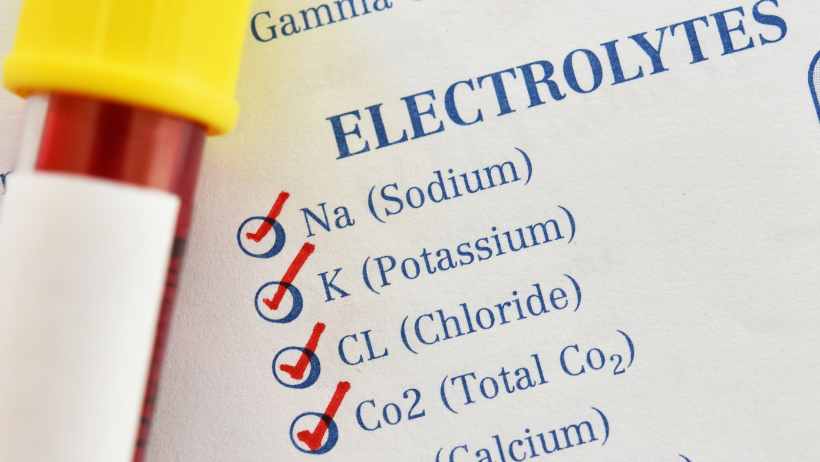
In order to preserve optimal physiological processes, it is vital to comprehend the importance of electrolytes. Electrolytes, including sodium, potassium, calcium, and magnesium, are critical minerals that are indispensable for the functioning of numerous physiological processes.
Although sports beverages are widely acknowledged as a source of electrolytes, these vital minerals are also present in a variety of foods. Bananas, avocados, sweet potatoes, spinach and kale, legumes and lentils, pistachios, oranges, yogurt, strawberries, bone broth, coconut water, milk, cantaloupe, pickles, tomatoes, potatoes, prunes, chocolate milk, and tofu are all examples of foods that are rich in electrolytes.
In addition to supporting muscle and nerve function, regulating heart function, and sustaining fluid homeostasis, these nutrients can contribute to overall health and wellness. However, to optimize their benefits, these foods should be consumed in moderation and as part of a well-balanced diet.
The Value of Electrolytes
Electrolytes are critical minerals that serve an indispensable function in the regulation and maintenance of bodily processes. They are present in bodily fluids such as interstitial fluid, blood, and urine, and are electrically charged. Electrolytes contribute to the maintenance of fluid equilibrium, the conduction of electrical impulses, the support of numerous physiological processes (e.g., muscle contraction and nerve function), and the regulation of pH levels.
A Description of Electrolytes
Electrolytes are minerals that, when dissolved in water, dissociate into ions. The positive or negative charge of these ions enables them to facilitate vital physiological processes in the body and conduct electricity. Among the most prevalent electrolytes in the human body are magnesium (Mg2+), calcium (Ca2+), sodium (Na+), and potassium (K+).
The function of electrolytes within the body
Electrolyte balance and presence are vital for the correct operation of the human organism. Every electrolyte fulfills a distinct function in various physiological processes.
Sodium Sodium is essential for the maintenance of the body’s fluid homeostasis. It aids in the regulation of intracellular and extracellular water levels, ensuring that cells remain adequately hydrated. Additionally, sodium is involved in the transmission of nerve impulses and muscle contractions.
The element potassium
Potassium is essential for modulating muscle contractions and maintaining a regular heartbeat. It aids in maintaining fluid balance in the body, thereby ensuring that all cells are adequately hydrated. Additionally, potassium is essential for the transmission of nerve impulses and the generation of energy.
Calcium calcium
In addition to being essential for the formation and upkeep of healthy teeth and bones, calcium is also vital for nerve transmission, muscle contraction, and blood coagulation. It supports enzyme activity, aids in the regulation of cardiac rhythm, and guarantees the proper functioning of cell membranes.
The element magnesium
Due to its involvement in over 300 biochemical reactions within the body, magnesium is an electrolyte of critical importance. It facilitates the maintenance of bone health, aids in the regulation of blood pressure, supports muscle and nerve function, and contributes to energy production and protein synthesis.
The importance of preserving electrolyte equilibrium
Ensuring electrolyte homeostasis is vital for the preservation of optimal health and overall well-being. Either an excessive or deficient electrolyte balance can cause a variety of health problems and disrupt the body’s normal functions. An excess of sodium, for instance, can result in dehydration, muscle cramping, and even neurological complications.
In a similar fashion, potassium deficiency can result in muscle weakness and an irregular heartbeat. Hence, it is critical to ensure proper electrolyte balance by adhering to a balanced diet and maintaining adequate hydration.
The origins of electrolytes
Although sports beverages are frequently linked to electrolyte replenishment, there exist numerous dietary sources that can supply the body with the essential electrolyte balance.
Sports beverages are specifically formulated to restore electrolytes and fluids that have been lost due to vigorous physical exertion or excessive perspiration. These consumables comprise sodium, potassium, and carbohydrates, thereby offering a rapid and practical means of rehydrating electrolyte levels. It is essential to note, however, that sports beverages may contain added calories and carbohydrates; therefore, they should be consumed in moderation.
Food Providers
Numerous foods contain electrolytes by nature and may aid in electrolyte balance maintenance. Consuming these foods is an excellent method to guarantee that you are receiving sufficient electrolytes. The following foods are examples of electrolyte-rich foods:
Potassium, an essential mineral for supporting muscle function and sustaining fluid homeostasis, is abundant in bananas.
Potassium and magnesium are abundant in avocados, which are beneficial for electrolyte homeostasis and overall health.
Due to their high potassium and magnesium content, sweet potatoes are an excellent source of electrolytes.
Spinach and kale are rich in magnesium and calcium, both of which are critical for proper functioning of muscles and nerves.
Legumes: Legumes such as legumes and lentils are an excellent source of electrolytes due to their high potassium, magnesium, and calcium content.
Magnesium and potassium are abundant in pistachios, which provides a wholesome amount of electrolyte support.
Oranges are an excellent source of calcium and potassium, which support overall health and aid in fluid homeostasis.
Yogurt is a dietary product that supports bone health and contributes to electrolyte equilibrium through the presence of calcium and potassium.
Strawberries are an appetizing source of magnesium and potassium, two elements that support muscle function and aid in fluid homeostasis.
Bone broth is an excellent source of numerous electrolytes, such as magnesium and calcium, which can aid in maintaining electrolyte balance.
Coconut Water: Coconut water serves as a revitalizing method to restore electrolytes as it is a natural source of electrolytes, including magnesium and potassium.
Calcium, which is essential for supporting bone health and sustaining electrolyte balance, is abundant in milk.
Watermelon is an advantageous choice for recharging electrolytes due to its high potassium, magnesium, and calcium content, in addition to its capacity to hydrate.
Pickles are an excellent source of sodium, an electrolyte replenishing substance that is notably beneficial following excessive perspiration.
Tomatoes are an excellent source of potassium and magnesium, both of which promote electrolyte balance and overall health.
Potatoes are an excellent source of magnesium and potassium, which are essential electrolyte support.
Prunes: Potassium and magnesium are abundant in prunes, which makes them an advantageous addition to the diet.
Chocolate Milk: Containing electrolytes such as potassium and sodium, chocolate milk is an effective and delectable post-workout recovery option.
Tofu, which is derived from plants, is an excellent source of magnesium and calcium, thereby aiding individuals on a vegetarian or vegan diet by providing electrolyte support.
Contradictory Sources
Apart from consuming sports beverages and foods as primary sources, there exist alternative methods to guarantee an adequate consumption of electrolytes. Electrolyte supplements, which are obtainable in capsule or powder form, have the capability to restore electrolytes in specific circumstances, including prolonged endurance exercises or situations where dietary consumption may be insufficient. Before beginning any supplements, it is crucial to seek the advice of a registered dietitian or healthcare professional to ensure proper usage and dosage.
The function of electrolytes within the body
Electrolytes are of paramount importance in sustaining the body’s overall functionality and health. Electrolytes perform the following essential functions in numerous bodily processes:
Balance of Fluids Regulation
Electrolytes, particularly potassium and sodium, are vital for the maintenance of the body’s fluid balance. They aid in the regulation of intracellular and extracellular water levels, ensuring that cells remain adequately hydrated. This equilibrium is critical for preventing dehydration and regulating blood pressure, in addition to ensuring optimal cell function.
Heart Function Control
Potassium and calcium, in particular, are electrolytes that are crucial for the regulation of cardiac function. Potassium maintains a regular heartbeat and promotes the contraction of the cardiac muscle. Conversely, calcium participates in the initiation and coordination of the electrical impulses that facilitate the rhythmic contraction of our heart.
Support for Muscle and Nerve Function
Sodium, potassium, and magnesium are examples of electrolytes that are essential for healthy muscle and nerve function. The conversion of sodium and potassium ions to electrical impulses facilitates signal transmission and communication between nerve cells. Additionally, they are essential for both muscle relaxation and contraction. Calcium and magnesium both play a role in muscle relaxation and contraction, in addition to contributing to healthy nerve function.
Implications for General Wellness and Health
Ensuring a balanced electrolyte system is critical for optimal physical and mental health. Sufficient consumption of electrolytes is essential for the maintenance of numerous physiological processes, such as cardiovascular health, muscle function, and nerve signaling. Adequate electrolyte balance has the potential to positively impact cognitive function, physical performance, and overall health.
The value of a well-balanced diet
Although incorporating foods abundant in electrolytes into one’s diet is crucial, maintaining a well-balanced diet in its entirety is of equal importance. A healthy electrolyte balance can be maintained through the moderation of electrolyte-rich dietary consumption and the incorporation of various electrolyte sources.
Moderate Consumption of Electrolyte-Rich Foods
Although foods that are abundant in electrolytes can help maintain electrolyte balance, their consumption should be kept in moderation. Sodium and other electrolytes that are consumed in excess can cause health complications such as fluid retention and hypertension. Hence, it is advisable to incorporate these foods into a varied and well-rounded dietary regimen, rather than depending exclusively on them to fulfill electrolyte requirements.
The integration of various sources of electrolytes is crucial for the maintenance of a well-balanced electrolyte regimen. Combining foods containing diverse electrolytes in differing proportions is advantageous in order to achieve a comprehensive electrolyte profile. An electrolyte intake that is both varied and balanced can be achieved through the consumption of whole cereals, fruits, vegetables, nuts, seeds, dairy products, and fruits.
Taking into account additional dietary factors
Although electrolytes hold significance, it is imperative to take into account additional dietary components that contribute to holistic health and well-being. In addition to vitamins, minerals, and macronutrients (carbohydrates, proteins, and lipids), a balanced diet should provide sufficient amounts of other vital micronutrients, including minerals and carbohydrates. By cultivating an assortment of nutrient-dense foods into your diet, you can not only promote electrolyte balance but also fulfill your body’s overall nutritional requirements.
In summary, electrolytes are indispensable for the maintenance of healthy physiological processes. They are essential for maintaining cardiovascular health, regulating fluid homeostasis, supporting muscle and nerve function, and promoting overall wellness and health.
Although sports beverages are widely consumed for their electrolyte content, numerous foods also contain these vital minerals. Yogurt and a variety of other foods that are abundant in electrolytes, including bananas, avocados, sweet potatoes, spinach, and kale, can assist in the maintenance of electrolyte balance.
Nevertheless, it is critical to incorporate these foods into a balanced diet that takes into account additional dietary factors and to consume them in moderation. By placing emphasis on a balanced and nutritious diet as well as maintaining proper hydration, one can guarantee ideal electrolyte equilibrium and promote overall health and wellness.










